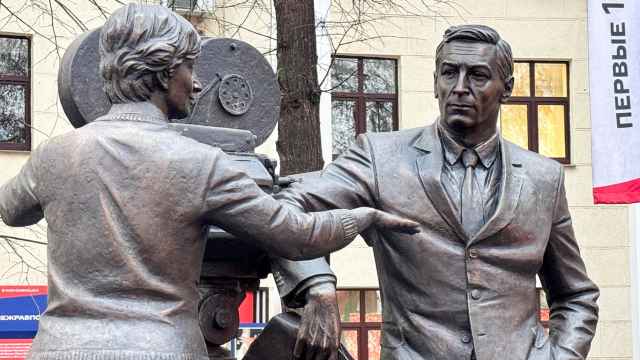Yury Olesha's "A Conspiracy of Feelings" was one of the dramatic works that defined an era in Soviet theater. Based loosely on the influential novella "Envy" and staged in 1929 at the Vakhtangov Theater, it did not remain in repertory long, though its fame and reputation were lasting. Olesha's sympathy for an ineffectual dreamer was not tolerable once the 1930s got underway, but it did provide solace to several generations of dissidents thereafter.
Olga Subbotina's production of "Conspiracy" at the Playwright and Director Center is often bold and colorful. It is also slow-moving and not always able to break free of the play's formal limitations.
Olesha was a schematic writer who often pitted select types against one another. "Conspiracy" is no exception. Here the playwright set up a trio of competing forces in the brothers Ivan and Andrei Babichev, and the amorphous figure of Nikolai Kavalerov. Each is less a person than a representation of differing philosophies of life.
Andrei (Vladimir Skvortsov) is a hyper-rational man of the future, the head of a food factory and the inventor of a new kind of sausage — "the sausage of sausages," he says. He believes in technology and progress. His brother Ivan (Ilya Ilyin) is a dark personality, a believer in romantic pain, suffering and the irrational. Kavalerov (Pavel Mamonov), a homeless man whom Andrei took in off the street apparently to exhibit his ability to feel compassion, dreams of doing something great, silly and pointless.
Alongside of them, though remaining in the shadows, is Valya (Svetlana Ustinova), Ivan's adopted daughter, the lover of Andrei and the object of Kavalerov's affections. She has affinities for no one but herself. She is a gold digger and a cold soul who even makes Andrei look soft at times.
Grigory Dantsiger plays Andrei's attorney Solomon Shapiro as a self-serving individual for whom life is nothing but the pursuit of success and style, all else be quietly damned. One can imagine him making the rounds of contemporary TV talk shows, dabbling in controversy to enhance his social status.
Twenty-two additional characters represent the workers at Andrei's factory, the inhabitants of a communal apartment and attendees at a football match where Ivan's dastardly plan to use Kavalerov to kill Andrei is put into motion.
Subbotina gives the play a contemporary feel even as she references its historical past.
Andrei's extravagant sausage-making machine looks both ancient and futuristic at once, rather like something out of Charlie Chaplin's "Modern Times." The sausages it creates are portrayed comically by long, red balloons. Characters open up computers or pull out smart phones to check facts on the Internet. Those attending the football match — including the spectators — must withstand the withering gazes of security forces and pass through metal detectors to enter the stadium.
Of all the competing figures, Ilyin's Ivan emerges as the most intriguing and the most sinister. He is a champion of "old" feelings, such as jealousy, rage and hatred. He laments that these throwbacks to a former age are on the verge of extinction in the progressive, rational modern world. He announces that he is "seeking a hero," that is, someone willing to sacrifice himself for a cause or idea, and is thrilled when one jealous man murders his unfaithful wife. This, he suggests, is a marvelous example of old-fashioned, emotional behavior. He claims to be the inventor of a miraculous machine that can do absolutely anything, whatever it may be — fly, sing songs or be sad — and he named it Ophelia.
Ilyin brings a winning amount of insidious passion to his character, drawing us closer to him with his likeability, but putting us off with flashes of evil.
This production of "Conspiracy" paints a bitter picture. The harsh, blustery Andrei is occasionally humanized by an ability to doubt, but his craving for the illusive Valya is less a genuine emotional attraction than it is a desire to attain personal power over a fellow human being. Ivan, ultimately, is little more than a terrorist for whom ideology is his only god. Kavalerov, whether a dreamer or an assassin, is utterly worthless and incompetent.
Perhaps this is why I could not shake the suspicion that Olesha's characters firmly resisted Subbotina's efforts to bring them to life. The ideas they stood for almost always eclipsed whatever human traits they had. In the end I enjoyed this show in parts, but its sum left me wanting more.
"A Conspiracy of Feelings" (Zagovor Chuvstv) plays Sun., Jan. 31, Feb. 5 and 7 at 7 p.m. at the Playwright and Director Center, located at 5 Begovaya Ulitsa. Metro Begovaya. Tel. 499-795-9282. . Running time: 3 hours, 15 minutes.
A Message from The Moscow Times:
Dear readers,
We are facing unprecedented challenges. Russia's Prosecutor General's Office has designated The Moscow Times as an "undesirable" organization, criminalizing our work and putting our staff at risk of prosecution. This follows our earlier unjust labeling as a "foreign agent."
These actions are direct attempts to silence independent journalism in Russia. The authorities claim our work "discredits the decisions of the Russian leadership." We see things differently: we strive to provide accurate, unbiased reporting on Russia.
We, the journalists of The Moscow Times, refuse to be silenced. But to continue our work, we need your help.
Your support, no matter how small, makes a world of difference. If you can, please support us monthly starting from just $2. It's quick to set up, and every contribution makes a significant impact.
By supporting The Moscow Times, you're defending open, independent journalism in the face of repression. Thank you for standing with us.
Remind me later.







